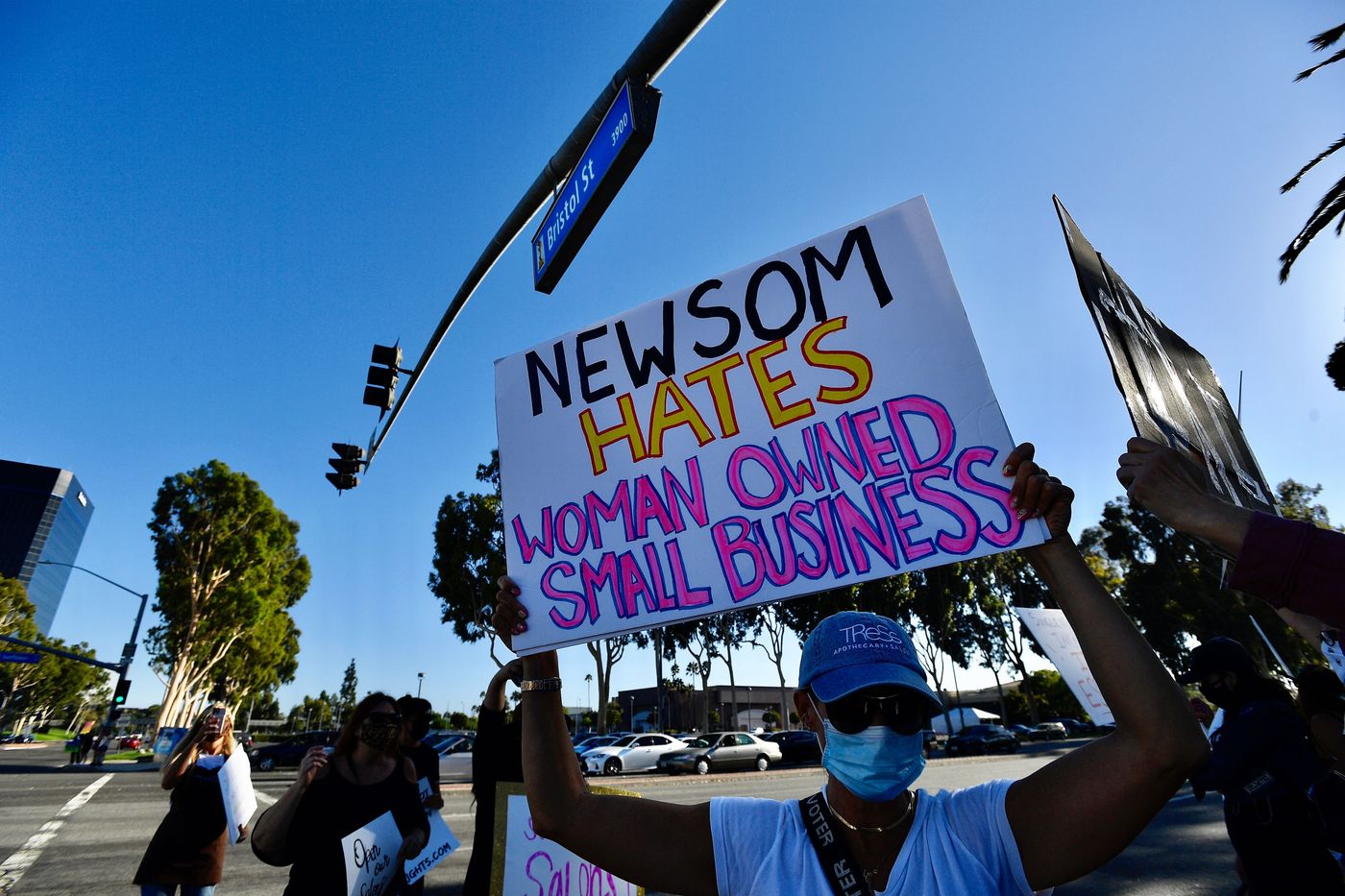
At first, Angela Marsden was worried about uploading the video she had taken because she didn’t want people to mistake her for an anti-masker. But she felt the hypocrisy she was seeing around California’s latest coronavirus lockdown was too much to bear.
Marsden owns a Los Angeles restaurant, the Pineapple Hill Saloon & Grill, which was forced to close because the county banned outdoor dining. In the two-minute clip, Marsden first shows the outdoor dining space for her restaurant, with no customers. Then she pivots the camera. Not more than 20 feet away, in the same parking lot, an almost identical tent with white plastic tables comes into view.
“I’m losing everything. Everything I own is being taken from me, and they set up a movie company right next to my outdoor patio,” Marsden says tearfully into the camera. “Tell me how this is dangerous, but right next to me — as a slap in my face — that’s safe?”
The clip went viral, racking up millions of views and netting the restaurant more than $200,000 in GoFundMe donations.
“It was so blatant and in your face, and it was so easy to finally see what maybe a lot of people have been saying but nobody was understanding,” Marsden told Intelligencer of the response to her video. “There’s only so much a person can take.”
In Los Angeles and elsewhere in the Golden State, a sense of anger with seemingly contradictory lockdown orders is growing along with virus cases, which are reaching new records across the state. It’s a major reversal of fate for the first U.S. state to impose a lockdown in March, a move hailed as a success that kept the state from experiencing a surge of infections and death like what happened in New York. Following the spring shutdown, California reopened in June — only to enforce new restrictions in July. The state recorded a staggering 53,111 new cases Wednesday and it is practically out of ICU beds. The worsening crisis has led Governor Gavin Newsom to impose a stay-at-home order. While other states have similarly seen infighting, often at the hands of mask skeptics, the latest round of orders from state and local governments are driving a lot of Californians who might otherwise not have strong views on public health politics to question whether their leaders are making good – and fair – decisions. Protests against lockdowns have erupted outside public health officials’ homes and an effort to oust Newsom is strengthening, with half of the 1.5 million petition signatures to put a recall on the ballot already gathered.
“Even though California is largely a very liberal state, I think that there is this trust deficit in which people have stopped listening to certain people,” said Tara Kirk Sell, a senior associate at the Johns Hopkins Center for Health Security. “People are feeling like they’ve just had enough, and they wonder if it’s all futile anyway.”
When hospitalizations started rising again in early November, Newsom warned that he might have to soon pull an “emergency brake” that would shutter beauty parlors, wineries, and restaurants once more. Then he attended an indoor birthday dinner at Napa Valley’s famed restaurant the French Laundry — alongside the CEO of the California Medical Association. San Francisco Mayor London Breed, who is reportedly under consideration by Newsom to fill Vice-President-elect Kamala Harris’s seat in the U.S. Senate, attended the same restaurant for her own “small gathering” the following night. In mid-November, despite a travel warning, at least ten California lawmakers traveled to Hawaii for a four-day conference. The topic? How to reopen states safely. And just hours after voting in favor of a dining ban, Los Angeles County Supervisor Sheila Kuehl was spotted in Santa Monica eating outside at her favorite neighborhood Italian restaurant.
The glut of double standards is worrying health experts who see the public’s mounting frustration with lockdown orders from apparent hypocrites turning into rage and rebellion — a potentially deadly outcome as the state is experiencing the worst pandemic surge it has yet seen. “The public’s mounting skepticism has nothing to do with anything … that’s not how the viruses think. As long as there’s people, they’re going to be burning through them,” said George Rutherford, a professor of epidemiology and prevention of infectious diseases at the University of California, San Francisco. “So if we’re basically surrendering and saying, ‘Okay let’s just go back to doing everything again,’ that’s tens of thousands of additional lives in California dead.”
But while politicians like Newsom promise to lead by a better example in order to mitigate virus spread, others have offered a message of resistance and, in some cases, defiance.
In Los Angeles County, where COVID-19 cases are the highest in the state, individual cities bucked the county health department’s recommendations to shut down all restaurants for dining, both indoors and out. This month, the Beverly Hills City Council voted to oppose the county’s outdoor dining ban. Pasadena, too, kept outdoor dining open. Some towns have taken brazen steps to create their own health departments to circumvent the county’s public-health rulings entirely, a move dubbed by some as a “mini secession.”
The county’s infighting later came to a halt on December 3 when Newsom issued a statewide stay-at-home order that banned in-person dining at restaurants, limiting them to carry-out and delivery, as well as restricting most other business. Residents were quick to point out that the ban seemed exceptionally convoluted and even arbitrary. As the statewide order stands, people are advised to not leave their homes unless necessary, but they can also shop at retail stores, which are allowed to remain open to 20 percent capacity. The new order restricts residents — who live in a state with year-round warm temperatures — from sitting at parks with friends, but still allows them to attend outdoor workout classes with strangers. The biggest criticism was a part of Newsom’s order that allows adults to play golf together while barring children from entering public playgrounds.
“If you put all these policies in place, to have these restrictions, they really need to be justifiable and based on facts that are included in the communication,” said Johns Hopkins’ Sell. “People now know a lot about COVID-19, and they say, ‘Well, why this and not that? It doesn’t make sense to me.’”
The blowback is already having results. Last week, the state reversed the playground closures. That same week, a judge ruled in favor of a lawsuit brought by the California Restaurant’s Association against Los Angeles County that argued that leaders “arbitrarily” targeted restaurants for closure without offering evidence they were spreading the virus. Proponents hope that once the statewide stay-at-home order is lifted, the judge’s ruling will force the hands of local leaders to re-open restaurants in L.A.
At the Pineapple Hill Saloon & Grill, Marsden has embraced her new role as an advocate for suffering California businesses but ultimately has no idea how things will play out for her personally. She has only had one profitable month since the pandemic started, and she has spent more than $60,000 to meet California’s safety measures and build-out her patio for outdoor dining. All of the money she has raised online will go toward paying her debts in the hope that she can keep the 42-year-old restaurant afloat. For now, the restaurant is closed even for to-go orders.
“My bookkeeper said, ‘Listen, with what little money we made in October, you cannot open to-go because it will be gone,’” Marsden said. “And then we will never reopen again.”

